- From Faith Current: “The Sacred Ordinary: St. Peter’s Church Hall” - May 1, 2023
- A brief (?) hiatus - April 22, 2023
- Something Happened - March 6, 2023

Sure, we’re all smiling before we deal with the book business.
Eagle-eyed commenter Sandy wrote, late last night:
I don’t know if anyone is interested but here you go
from Mark [Lewisohn]’s twitter today:
“The extended edition of Tune In has sold out and is now unavailable. Another print may or may not be scheduled at some future time. The e-book (issued in two halves) IS still available, but it’s UK only. My US publisher, Crown, wouldn’t issue the extended book and couldn’t agree terms for the e-book. I’m sorry about that, for me and for everyone in US who wants to buy it, but I can do nothing about it.”
To which our own Nancy replied:
Sandy, that’s crazy. WHY can’t the extended edition be released in the U.S.? And WHY wouldn’t the publisher immediately reprint the British extended edition, if it sold out so fast? Here’s hoping things change. Having now read the one-volume version, I can only second Devin’s hearty endorsement of Lewisohn’s work. This biography is exemplary.
Which moved Devin to say:
As of today, the Extended Edition is listed at Amazon.co.uk as “Currently unavailable,” with 1 new copy being offered for 728p, 68s — close to a 900% increase over the original price, and probably not uncharacteristic of what others will be asking. If years pass and no reprint appears, that figure will only rise. The likeliest scenario may be that a high-end specialty publisher (say, Genesis Publications, which put out Ringo’s photo book) will pick up the rights and offer a new limited edition, at an accordingly inflated cost.Boy, am I glad I got mine right away. The price seemed steep at the time, but right now it’s looking like a bargain.
Devin’s idea might be how it shakes out, in five years or so, once all the acquiring editors have moved on. Here are more thoughts, as a Beatlefan and grizzled veteran of the publishing industry:
Why No US Tune In Extended Edition Ebook?
I can only assume from Mark’s tweet that Crown (a subsidiary of Random House) was afraid that a print Tune In Extended Edition would cannibalize sales of its standard edition—and remember, sale #1,000,000 is much more profitable to a publisher than sale #1,000, thanks to economies of scale. But that doesn’t really explain why there’s no US ebook Tune In Extended Edition.
Lewisohn’s “Couldn’t agree [to] terms” may be a clue: Publishers often force through unreasonable terms for the ebook section of book contracts; in yet another example of the Man Holding Us Down, an ebook sale generates more profits for the publisher but pays less in royalties to the author, than a comparable print sale. Why? Because they can. Big publishers are determined that ebooks replace paperbacks in their mix; that’s why here in the US, ebooks are often US$9.99, an absurdly high price given that there are no recurring costs. (Yes, it costs something to turn a print manuscript into a .mobi, .epub, et al file—but realistically, ebook sales are all profit.) Lewisohn’s Standard US ebook is priced at $13.99.
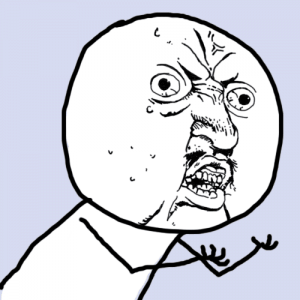
WHY U NO SELL GIANT BEATLE BOOK?
People Want to Read; Quick, Let’s Gouge Them
A quick aside: high ebook prices in the face of increasing ebook consumption is insane. First, it feels like a ripoff. Second, it discourages reading from returning to its former status as a truly mass-market endeavor, which is the only way traditional publishing will be able to survive in anything like its current form. Third, it encourages piracy. Fourth, it practically begs for an external solution—just like what happened with Amazon, a single, non-publishing specific company which now controls the entire future of book publishing in the US.
So in this Alice-in-Wonderland world, unless demand is so predictably huge that you can finagle the kind of sweetheart setup as Tune In’s UK publisher has–sell the extended version in two ebooks, each £19.49–you’ll refuse to fulfill your contractual obligation to sell the product to buyers, regardless of likely demand. And unless the writer wants to sue, he’s stuck. Book contracts are the work of Satan.
But Wait, It Gets Worse
Where it gets truly Satanic is this: it is highly likely that a single phone call from Little, Brown to Crown could allow them to sell their UK Tune In Extended Edition ebook freely in the US; but because LB is Hachette, and Crown is Random, Crown is probably worried that if it sells the rights, and the Tune In Extended Edition ebook sells significant numbers in the US, they (Crown) will look like idiots. Plus they don’t want the extended edition to eat into their standard edition sales. So they are almost certainly asking for an exorbitant amount, to put LB off. And it’s highly likely that neither side is willing to show each other sales figures, making it all even more stupid and paranoid.
Have you noticed something in all this? How what readers want, and will pay for, doesn’t enter into it? How actually selling books—the publisher’s only explicit contractual obligation—doesn’t seem to enter into things, much? This is, of course, insane; everybody is making less money, with Mark Lewisohn losing by far the most, proportionally. Just as bad, this unavailability will further encourage piracy—now that the ESE isn’t available, it FOR SURE will appear in PDF form online, and whatever sales could’ve been had, will be lost forever. Worst of all, these reindeer games will depress the sales of Volume One, which will lead to smaller promo budgets, less salesforce support, and smaller sales, in every format, UK or US, for Volumes Two and Three.
So, What To Do?
If I were Mark Lewisohn—and I am not, and this would be incredibly unfun and terrifying and would delay his research, but—I would have a team of lawyers looking over my US deal, specifically any clauses relating to rights purchased but not exercised. If the US ebook ESE rights can be determined to be unfairly withheld—via arbitration if possible, a court of law if necessary—Mark may be able to get the US ebook rights reverted to him. Then he could purchase the ebook files from his UK publisher (giving them a bit of unlooked-for money) and release it in the US on Kindle. If demand for that edition were strong enough—and imports may already show this—a print ESE edition could be arranged for the US in a similar fashion—buying the plates from Little, Brown (UK) or Crown (US).
If you’re reading this advice, Mark, it’s worth exactly what you paid for it—but I wish you the best. Your work is fabulous and deserves to be supported to the hilt, in every way possible. I hope you have good agents and lawyers, and that they, if at all possible, are related to you.

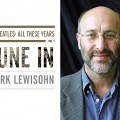
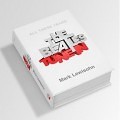
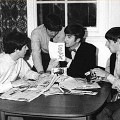
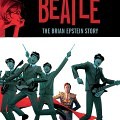
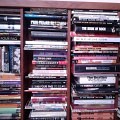
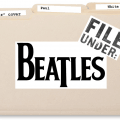




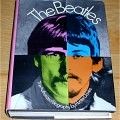

Can you explain to me why there was a full-length UK version, and an abridged US version? Why couldn’t there have been ONE full-length UK version of Mark’s book, available worldwide? It reminds me of the old Parlophone/Capitol days, where the UK would get a proper album, and the US would get an album with tracks missing, in the interest of… what? Not the fans.
Good points about the insanity of ebook publishing today, Michael. I actually think there would be more demand for a physical reprint of Lewisohn’s extended edition than for an ebook version (I am certainly kicking myself for not buying one, and I’m sure I’m not alone). But you’re right that what buyers want seems not to carry much weight. I really hope Lewisohn can find some way to get some leverage and get a reprint done.
@Nancy, there may well be more US demand for a print ESE over an ebook one, but what we’re talking about here is blunt risk/reward. Producing an ebook is much much less expensive, so that’s why I suggested it.
Somebody must have already decided that a US print ESE didn’t offset the risks/costs, otherwise Crown would’ve done one. I expect they pulled a P&L for a similar book (and that’s the rub, what’s similar?), which “proved” US fans wouldn’t buy an ESE in sufficient quantities to justify the extra expense.
The unfortunate thing is, once the author signs the deal, he/she has no leverage—not unless you want to give back the advance, which is impossible in this case I’m sure. A big advance, a multi-year project with a lot of research expenses…impossible. And also you don’t want to imperil the future two books—I’ve had a multi-book contract pulled, after the publisher didn’t promote the first one, and sales were poor. They had some idea that I myself was going to drive sales by…they never said how, exactly. But all the sudden, that $50,000 that I was promised—and had been counting on—disappeared. Because they changed their mind. You don’t want your publishing house to change their mind. Suffice to say that there’s a lot of pressure on every author to keep the house happy.
Lewisohn is really in a bind here, and it’s a bind that’s set up on purpose, to give publishing houses maximum freedom of action. Now, if Little, Brown decided to go back to press with a UK ESE that could be bought via import, that’s another story. That’s really the only happy ending I can see to this, without things getting sticky.
It’s all a damn shame, because the ESE is a fabulous book, and Lewisohn deserves to have his work put out lavishly.
Speaking as someone who’s dealt with a lot of multi-territory books, the most likely answer, @Sam, is this:
1) Lewisohn got a much better total advance for breaking the rights into two; and
2) only after he’d signed on the dotted line, did Crown—now having control over all meaningful decisions regarding the book—say, “Uh, yeah, Mark, we’re not going to offer the ESE in the US.”
Unless Lewisohn wanted to give back the advance AND get a crappier US deal (because now he’d be desperate), he would be forced to accept Crown’s decision, which makes no sense from an external perspective (there was/is clearly demand for the ESE in the US), but is standard operating procedure if you’re used to working with US book publishers. Like I said in the post, Crown’s decision to only have a standard edition in the US was likely because they didn’t want to split the market, and/or didn’t feel that US demand for the massive ESE would be high enough to justify the additional production costs of making it.
These are just guesses, @Sam, but I’ve been in Lewisohn’s position. It’s not fun.
This makes me hope Lewisohn got a crate or two of the extended edition, so he can profit from the insanity his publishers are creating. That copy listed by a private seller on Amazon.uk is offered for the equivalent of $1190.08.
Add me to the list of people who are thankful as hell they got their hands on one when they were still available. Anyone know how many ESE’s were sold? At $120 per, even just a few thousand copies would equal a crapload of money.
It’s a crapload of money, @Beasty, but there are lots of people taking their cut, and the author is the last in line.
Sales information is very closely guarded; even authors can’t get figures—because if they could, they could dispute their royalty statements, and no publisher wants that. There’s a new point-of-sale thing called BookScan which gives you better numbers on book sales, but the publishing business fought it for years. As with Amazon, it’s a company outside publishing—Neilsen—that’s the driver.
I suspect Little, Brown printed a relatively small number of ESEs–I can’t imagine more than 10,000, and 5,000 or 7,500 is more likely. I can’t tell you how much the publisher netted on each one (my wild guess would be 35% of cover price), but if the terms of Lewisohn’s deal were standard ones, with no escalators, him getting an average of 10% per ESE would be not crazy. But that money doesn’t go to him; it’s credited against the first 1/3 of his UK advance (three-book deal reported at £1.2m, or £400,000). And remember his UK agent takes 15% of everything he earns on that deal.
So, as a total guess:
7.5K @ £75 ea = £562,500
amount credited against Lewisohn’s UK advance = £56,250
amount Lewisohn would receive from ESE sales, when/if advance was earned out = £47812.50
…which is not nothing, but it’s hardly a King’s ransom.
Remember, too, that the UK deal was signed in 2004, so he’s been living on that advance for ten years, and paying research expenses all the while (I suspect he knows Hamburg Airport rather well by now). Advances are paid out in thirds–1/3 on signing, 1/3 on delivery of manuscript, 1/3 on publication. Given that he’s been researching for ten years, my guess is that Lewisohn probably got 1/3 of the total deal on signing. Even with lots of foreign deals, that’s not a fortune for 10 years of work…which is why it’s so annoying that his book can’t be bought by everyone who wants to buy it, in the form they want to buy it in. Piracy is now inevitable, and while it hurts everybody along the chain, it hurts the author most, for reasons that are obvious.
If you look at the reviews of Lewisohn’s book, his best reviews were in the UK, where the publisher assumed the UK reading public would be interested in buying a 900-page edition of the book, and the collectors would go for a 1,600-page extended edition. But the reviews of Tune in from the U.S. newspapers and magazines were far more mixed, with many reviewers complaining about the amount of excessive detail in Tune In, and some being critical of Mark’s prose style. So perhaps, as usual, the American publisher was shortchanging the intelligence of American readers and their patience to read even a 900–page book, let alone the extended version. But also, given the more mixed reviews of Tune In in the states, perhaps the American publisher was right and knew the American audience would prefer a prose stylist with a bit more flair and a bit less detail about the music industry.
I would love to see sales figures, to know how many copies sold in the US compared with the UK, for example.
Mark: If you’re reading I bought the American edition. I also bought a copy of the extended edition from the UK (which included a hefty shipping fare). And, when I didn’t want to lug a 900-page book on vacation to the beach (and ruin the book in the sand), I also bought the e version for my Kindle!
I think Mark has made enough money off of me. 🙂
@Drew, I think you’re onto something with this:
perhaps the American publisher was right and knew the American audience would prefer a prose stylist with a bit more flair
But here’s the thing: ten years ago, when I was selling a lot, the US market was roughly five times bigger than the UK one. Things can be a niche taste in the US (and an 1800pp biography of The Beatles is definitely that!), but still sell plenty of units.
If Crown had been really worried about the ESE being too much for Americans, the obvious solution would’ve been to offer it in ebook format, and see if demand was there. Not offering an ebook of the ESE in the biggest bookselling territory is so nuts, it must be politics. That’s why I posted. They’re leaving money on the table; why?
@Michael Gerber, I’m confused about something though. I remember Mark saying that the ESE would not be a limited edition. So why then is there a question of whether they will print more? Is that decided before the signing of the deal? Great discussion by the way.
@Linda, once the deal is signed, all such decisions are 100% controlled by the publisher, with no recourse on the part of the author other than attempting to invalidate the contract. (Which would mean giving back any advance, and/or arbitration or suit.)
If a publisher wanted to give you an advance of $1,000,000, and then only publish 50 copies of something—or not publish the manuscript at all—they could do that. By going to press once with the ESE, LB has satisfied the terms of the deal. Of course there’s still demand for the print ESE—that’s why this is news—but the question will be: is it big enough to justify another wodge of capital from Little, Brown? Will the stores stock it? What will returns be like?
This is assuming, of course, that the deal is somewhat standard—I have no knowledge of this deal in particular, and my thoughts in this discussion are based on my own contracts, plus knowledge of “the usual deal.”
If Crown had been really worried about the ESE being too much for Americans, the obvious solution would’ve been to offer it in ebook format, and see if demand was there. Not offering an ebook of the ESE in the biggest bookselling territory is so nuts, it must be politics.
Here’s a crazy idea: Did Crown use some flawed demographic equation, believing the American market for an ESE ebook would be small, worrying that older baby boomers haven’t embraced the technology? And thinking the only people interested in the ESE would be technophobic geezers (like me)?
That’s probably exactly what happened, @Sam.
I contacted Blackwell’s, the UK bookseller, about the extended edition because their website listed it as “Reprint: date known.” A customer service representative sent this response to my email:
“Having contacted our supplier I regret that they have advised that ISBN 9781408704783 is now out of stock indefinitely with no plans for a reprint.”
So it’s unfortunately official that what’s out there now of the print extended edition is all there will be.
Saddest of all: pirate PDF online in 3..2..1…
I wish there was some sort of capitalist hack we could come up with, so ML would get paid.
I wonder if an academic or university press might step in and rescue the ESE? They’re niche publishers to begin with, and I’d say 1600 pages of Beatles (x3 volumes) qualifies as niche. If Little, Brown is unwilling to invest in a new print run, and Crown was unwilling to take a chance on the ESE at all, perhaps they’d be willing to part with the rights. (Although my cynical attitude towards business leads me to think they’d prefer to sit on the rights and let them rot rather than publish on any terms but their own. “If you’re not gonna play the way I want you to play, I’m going to take my ball and go home” kind of thing.)
Random thought: Perhaps Lewisohn could look into Kickstarter to get the funds to, at the very least, buy back the US ebook rights.
@Monica, if book publishers thought like this, the world would be a better place. But I suspect that Crown
1) thinks that ESE buyers would depress the sales of their standard edition; and
2) wouldn’t want someone else to succeed with the ESE in the US.
I think Kickstarting is a fantastic idea–it’s one printing, so wouldn’t dilute standard sales over the long term; could carry a high pledge point (since it would be a limited-edition) and so forth. It would be a way for Devin’s Genesis suggestion to happen, without having to wait for the current rights situation–which is related to a sense of current sales–to cool down.
Crown could run the Kickstart–have a goal of $50,000–and offer print copies at $200 plus mailing, with ebook at $25–and make a lot of dough. If 1000-1500 US readers don’t want the ESE under those terms, there really isn’t a big enough US market for the ESE.
On the Tune In website today there is this. but it does not tell you how many is needed to print
We are delighted to announce that the extended special edition of The Beatles: All These Years (Volume One: Tune In) is now available for fans to order once more, following its initial print-run selling out last year.
Tim Whiting, Publishing Director for Little, Brown Non-Fiction, said:
‘We are aware of the fact that many people did not get a chance to purchase copies of the extended special edition of The Beatles: Tune In. We would therefore like to clarify that we are intending to reprint but that due to the cost of printing the book, we need a certain number of orders before we can do so. We would like to invite readers to place their orders via this link on our website or via Amazon UK. Customers’ credit/debit cards will not be charged until their copy of the special edition has been dispatched.’
Somebody get a torrent of the Extended Edition up!!
I think it’s available again conventionally, @RW.
[…] is also the matter of the 1,700-page expanded version released only in the UK, quickly selling out and not looking likely to appear anywhere else in the world […]